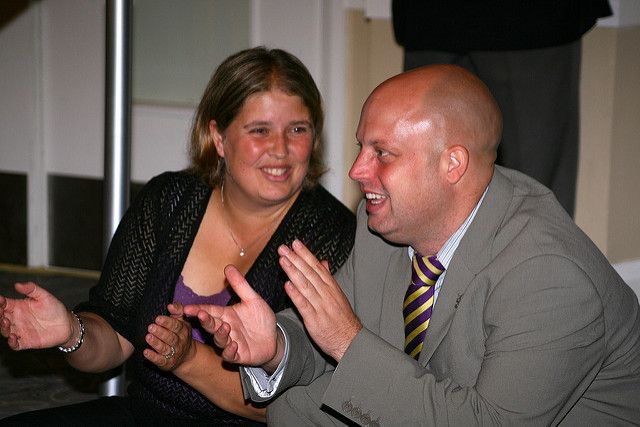
It's time, says UKIP leadership contender Lisa Duffy, for Britain to start talking more openly about Islam's place in society. "I think it would be wrong of any political leader in this country," she says, "not to recognize that Islam has the potential to become a big issue within our country."
Duffy's views on the topic have already made something of an impact. The Cambridgeshire councillor, one of five candidates for the party leadership, launched what she called a "positive vision for British Islam" at the start of her campaign. This includes a call for the closure of Muslim faith schools "until the Islamist terror threat is securely in remission," and a requirement to remove the Burqa face veil in some public places. She was accused by her rival, Bill Etheridge, of chasing the "bigot vote," a charge she strenuously denies. "The vision paper I put forward, it's very positive; it's about integration, opportunity and equality," she tells Newsweek.
The row might, at first, feel familiar. Members of UKIP, a populist right-wing party until recently led by the proudly politically incorrect Nigel Farage, have been accused of bigotry, racism and much else besides throughout its 23-year lifespan. Each time, in turn, they have insisted they are simply voicing voters' legitimate concerns.
But Duffy's "vision" could mark the start of a shift. UKIP, despite appealing to anti-immigration voters, has not in recent years made reforming or rejecting Islam a central focus of its policy or rhetoric. In this, it stands in marked contrast to some of its equivalent parties in continental Europe. In Germany, the Alternative for Germany (AFD) has called for a full ban on the burqa, on minarets and on the call to prayer, and even officially states that Islam is not compatible with German society. A senior member of Denmark's right-wing People's Party recently called for all Muslim immigration to be temporarily banned in the country. In France, Front National leader Marine le Pen counts the eradication of "Islamism" among her most enduring themes.
UKIP under Farage, by comparison, concentrated more generally on the impact of immigration. So could we start to see more of a specific focus on Islam in the party's rhetoric?
"It's quite plausible," says Rob Ford, a professor of politics at Manchester University and co-author of Revolt on the Right , a book on UKIP. "In some ways, if you just look at some of the raw attitudes, it looks like there's a very big potential market for it. British views of Muslims are often quite negative, there are a lot of anxieties particularly around cultural practises, cultural integration and so on."
The party is also in need of a new USP (unique selling proposition) after Britain voted for Brexit, and its old rhetoric on immigration was largely focused on the issue of unskilled immigration from the European Union. Assuming new restrictions are placed on freedom of movement once Britain leaves the bloc, that won't cut it any more.
But, Ford says, there are caveats to this. First, under the U.K.'s first-past-the-post electoral system, winning even the 20 to 25 percent of the vote that might be highly concerned about Muslim integration is not a recipe for success, unlike in some European countries with more proportional systems.
But also Britain has, Ford says, "been ethnically, racially diverse for longer than many countries and we've been actively talking about it for a lot longer than many countries.
"Germany denied that it was even a country of immigration until the late 90s and in France they still won't gather statistics by race... We've had 50 years of discussion and work in terms of setting up and policing certain boundaries of political rhetoric," Ford says.
An ongoing row in France, and Duffy's response to it, illustrates his point. Fifteen towns on the French coast have moved to ban the "burkini," full-cover swimwear worn by some Muslim women. When asked about the bans, Manuel Valls, the country's prime minister and a politician on the mainstream center-left, responded without hesitation that the burkini was "not compatible with the values of France."
Duffy, by contrast, doesn't even back the ban, which she calls a step too far. "If a motorcyclist sat on the beach and he wanted his helmet on, that's up to him. He might sweat a bit. But I'm not going to prescribe what people should or shouldn't be wearing," she says.
Duffy says that her policy on Islam is aimed at boosting equality for Muslim women as much as anything else. "I've worked with a lot of British Muslim females and they haven't had the same opportunities that I've had or my daughters will have," she says. Of course, plenty of politicians with far tougher anti-Islam platforms make the same argument.
Still, however cautiously, the issue of British Islam has been forced higher up UKIP's agenda, and it's hard to imagine it won't stay there in some form. UKIP is, Duffy tells Newsweek, "unique as a party in talking about challenging issues and opening the debate. And I think if we don't start talking about the potential of what radical Islam can do to our country moving forward then we are missing a trick."
Uncommon Knowledge
Newsweek is committed to challenging conventional wisdom and finding connections in the search for common ground.
Newsweek is committed to challenging conventional wisdom and finding connections in the search for common ground.
About the writer
Josh is a staff writer covering Europe, including politics, policy, immigration and more.
To read how Newsweek uses AI as a newsroom tool, Click here.








